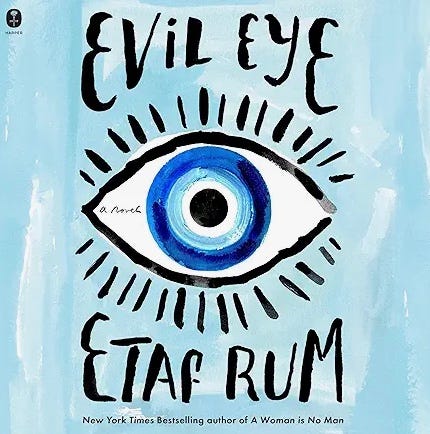BookLife Review by Carol O'Day: Evil Eye (Etaf Rum, author)
Palestinian-American woman, North Carolina, arranged marriage, motherhood, artist, intimacy, loneliness, friendship, secrecy in marriage, cultural expectations, subjugation of women, divorce
Yara Murad is trapped—in her marriage, in motherhood, in cultural expectations surrounding her life as a wife and mother, in her stalled career, and in her own fear of change. Her Palestinian parents emigrated from a refugee camp in the West Bank to Brooklyn, New York. She as been raised to be grateful for all that she has—a secure life, a husband with a good job, two healthy children and a lovely home. She is grateful, and she is unhappy.
In her Palestinian Arab-American community, there is a strong expectation that all housework, cleaning, cooking and child-rearing are the domain and responsibility of the wife and mother. Her mother-in-law regularly inspects her home for cleanliness and scrutinizes each traditional dish she prepares for her husband. Her in-laws disapprove of Yara’s interest in working outside the home and view it as a sign of dissatisfaction and ingratitude. Her husband is disconnected, despondent and content to eat all of his dinners on his bed in front of the television. I confess, I chafed a bit at the start of the book, frustrated by the protagonist’s submissiveness, lack of insight and willingness or need to comply with the strictures surrounding her, despite what appeared to be the freedom to change. Yet, the bonds that oppress are strong and run deep. I persisted convinced that I was imposing my cultural norms onto Yara’s.
Yara faces racism at work and one day snaps at a colleague for a racist remark voiced about Yara. Yara is shocked to learn that she is required to attend counseling to address the anger revealed by her response while her racist colleague is not sanctioned. In therapy, Yara initially resists exploring her childhood. But, while at her therapist’s office encounters a colleague, a gay culinary arts teacher, and the two become friends.
Bit by bit, Yara acknowledges the anger simmering inside her, and begins to explore its origins and triggers. She confides in her new friend. She begins extensively journaling. Inch by inch, Yara faces her past traumas and begins to identify and release her anger. Her journey allows her to claim her autonomy and her future. It is not tidy. It is not linear. It is very real. The universality of oppression, trauma, abuse and neglect and empowerment across cultures, is laid bare. While I failed to fully connect with this protagonist and squirmed at her choice of some of the details she chose to show intimacy and estrangment, spending time with someone different, even in a book, reminds us of our similarities.




